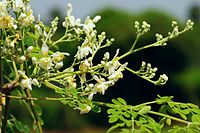
Photo from wikipedia
Carrot (Daucus carota L.) is an important vegetable, and one of the main sources of dietary pro-vitamin A carotenoids. Carrot accessions were investigated for genetic diversity using qualitative and quantitative… Click to show full abstract
Carrot (Daucus carota L.) is an important vegetable, and one of the main sources of dietary pro-vitamin A carotenoids. Carrot accessions were investigated for genetic diversity using qualitative and quantitative morphological traits and biochemical analysis at National Agricultural Research Centre (NARC), Islamabad, Pakistan. A set of 33 carrot accessions were subjected to agro-morphological evaluation which revealed that said genotypes have great variation for yield contributing traits (root’s weight, length and width) and various quality attributes i.e., root shape and color. Relationship among various traits based on correlation analysis showed some key facts with significant (p≤0.05 and p≤0.01) negative and positive correlation indicating the utility of the existing carrot germplasm. Cluster analysis divided and placed the accessions in five clusters, showing variations among accessions collected from geo-climatically diverse localities of Pakistan. Multivariate analysis enunciated a deep insight to understand variability pattern and relationship among carrot germplasm acquired from diverse ecologies of Pakistan. However, low variability with monomorphic banding was observed based on sodium dodecyl sulfate polyacrylamide gel electrophoresis (SDS-PAGE) analysis. Distinct root trait needs to be identified and further evaluation should be carried out on diverse genetic base on the basis of agro-morphological traits. Carrot accession 20238 from Khanewal area was found to be the most distinct accession as reflected by multivariate analysis. The promising genotypes could be used for the development of high yielding genotypes in future breeding program.
Journal Title: Pakistan Journal of Botany
Year Published: 2020
Link to full text (if available)
Share on Social Media: Sign Up to like & get
recommendations!